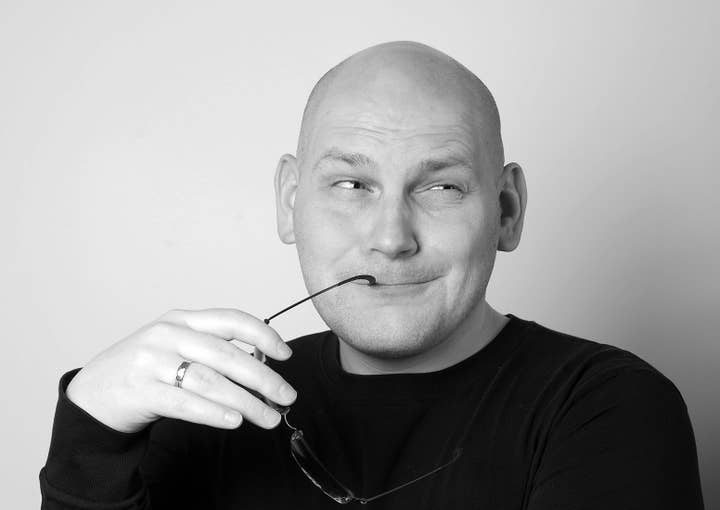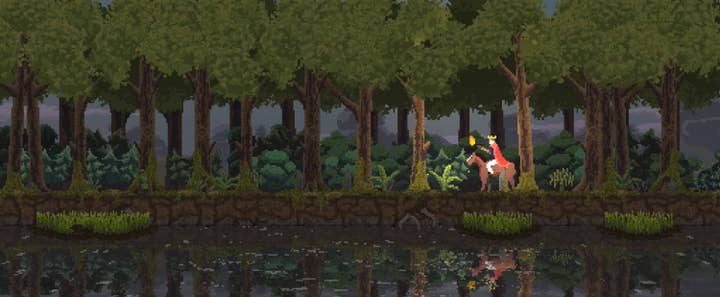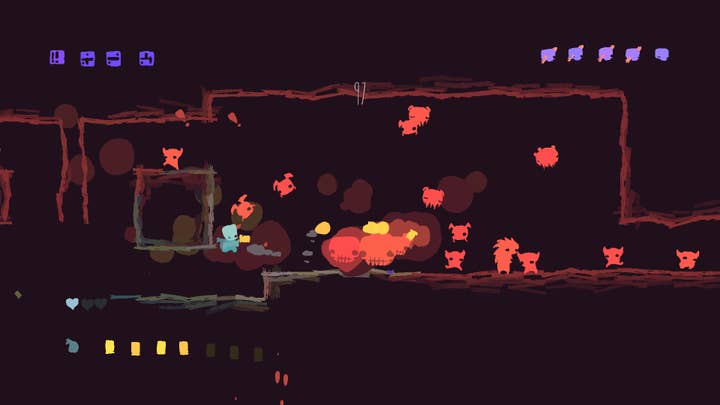“The one field in games that hasn't really been innovated upon is publishing”
Raw Fury discusses the importance of happiness and the ever changing role of the indie games publisher
Another week, another games publisher that wants to 'redefine what publishing means'.
It's become a common theme. Today we have publishers that don't like being called publishers. Or those that don't mind the word but want to 'transform what it represents'. And then there are those that have come up with their own label to describe themselves.
Companies like Stockholm-based Raw Fury, which describes its work as 'unpublishing'.
"Unpublishing is a word that came to us through a friend and we just adopted it," says CEO Jonas Antonsson. "The reason behind that is because before you redo something, you need to undo it first. You can build these developer/publisher relationships in new ways. And to do that properly, you need to unthink how it has been traditionally done."
Raw Fury is part of this new breed of games publisher that has emerged out of the digital marketplace. Developers do not need publishers anymore. There's no need to finance the manufacturing of discs or to have large sales teams. Steam, App Store and all the other digital marketplaces mean that creators can put their game out into the world with little to no help.

Inevitably that has caused an influx of content, which has over-saturated the digital marketplaces and made discoverability extremely challenging. The quality of games is increasing, too, and the cost of development is rising. So enter the publisher once again, who can help with PR and marketing, digital retailing, physical retailing, QA and localisation, porting to other platforms and - in some cases - with a bit of finance.
Yet the dynamics are different today. With the rise of Kickstarter and other investment solutions, developers still do not need publishers. The power has shifted and today's publishers are effectively service companies. The IP and the bulk of the revenue now remain with the creators.
"I love everything you just said," Antonsson continues. "I love that this is the change that we are seeing. Our ambition is to be a part of that and push that change even further. To accelerate it. When it comes to the creative aspects of the game, the power should be in the hands of the developer, absolutely. We often think about ourselves as the supporting act. We are the drummer when you need a drummer and the bass player when you need a bassist.
"There's no 9 to 5 here. We don't do milestones. We don't ask for specific deliverables"
"There's also another change happening that is openness, which I also really like. There are a couple of new entities in Sweden who are interested in becoming publishers, and we have been very open in sharing our thoughts and ideas and contacts... everything. From our perspective it is not helping the competition, it is helping a dynamic change for the industry overall."
On paper, Raw Fury doesn't appear too dissimilar to pretty much every other indie publisher out there (and there are lots). It offers marketing and PR services, it works with platforms and it can hook studios up with QA, localisation, voice-over and other contractors to help complete the project.

Yet Antonsson says the key difference is in how the firm goes about its business.
"For me personally, the biggest differentiator is that we try to be a 'for happiness' company," he explains. "I know that might sound strange or trite, but we truly believe that. I am a subscriber of something I like to call minimalist anachronism, or anarchism for lazy people. It's about not taking something at face value, or doing something because that's how it's always been done. It's asking yourselves: 'Is there a better way of doing it that makes people happier?'
"This permeates throughout everything we do. There's no 9 to 5. We don't do milestones. We don't ask for specific deliverables. We organise all that through open and co-operative dialogue. We don't set terms regarding what we want to see in the game, although we like to be part of the discussion, of course.
"We've only just got an office, and we've been operational for two years. We actually call it a hang out, and it's more just to have a central space where people can come and meet up."
Antonsson says it is this that has helped attract some major names to his team, including familiar faces from Battlefield creators DICE such as Karl Magnus Troedsson (former general manager and CEO) and Gordon Van Dyke (former Battlefield producer). The firm has also recently hired Roland Smedberg (the man who has been responsible for most of DICE's trailer output), and has a US team consisting of former Paradox PR manager David Martinez and Destructoid CEO Hamza Aziz.
"It is our mentality that has helped attract these old, jaded industry bastards that just want to have fun again," he says.
The emotional happiness of your team and clients is obviously important to any business, yet surely there's a balance to strike between having a good time and getting the job done?
"It is our mentality that has helped attract these old, jaded industry bastards that just want to have fun again"
"If the fundamental value is the spreadsheet and the money, then that will shine through," Antonsson explains. "But if the value is in the people, then that will also shine through. What we are starting to understand better is that for people who work with their heads all the time - creative people - it is not going to be the money or earthly benefits that motivates them. It is about feeling valued, that you are contributing and what you're doing has some form of impact. If you find a place where you get those feelings, then you will do everything in your power to safeguard that. You'll end up protecting a workplace if you see it as a second home or a second family. You'll do a lot of great work to ensure it doesn't go anywhere.
"I strongly think you can be a nice person and work on the philosophy of happiness and still be financially successful. Smart business can be built on those fundamentals, because smart people who find a place like this, they will do all they can to sustain it and build it up and make sure it is there long-term."
Of course there's more to Raw Fury than just being happy. It is desperate to help force through a wider industry change where good games triumph over sensible business.
"We live in a world that is defined by two words: 'games' and 'industry'," Antonsson says. "And over the last decade or so, the focus has been predominantly on 'industry' and less so on 'games'. That is something I don't like. We can't too heavily commoditise something that is inherently an experience. I think doing that is a dangerous path to take and we are seeing some of the worst effects of that currently with some of the problems in getting games out there and in front of an audience.
"The publishing industry is ready for a change. If you look at what has happened over the last ten years, there has been a lot of innovation in terms of tools, platforms, distribution and what you can actually achieve with the creation of games. But one field that has not really been innovated upon is the publishing model."
These issues, coupled with the relative absence of publishers looking after games in the Nordic region, was the motivation behind starting Raw Fury in the first place.
"We can't too heavily commoditise something that is inherently an experience. I think doing that is a dangerous"
Yet this is still a small company. It has just increased its headcount from five to eight, and currently feels comfortable tackling around six games at a time. That includes past titles, as the firm doesn't just drop a game once it's out - projects such as Kingdom (released in 2015) are still being promoted by the team today.
As for the type of games it looks to sign, Antonsson says it is all about the emotional impact, which shouldn't come as a surprise for a company that places so much emphasis on how its staff are feeling.
"I'm not a big believer in genre," Antonsson says. "What are genres good for? They're labels to describe a certain type of experience to someone else. What we are trying to find are games with a very clear emotional impact. Kingdom is all about the sense of wonder, discovery and suspense. It's about discovering things for yourself and it pulls you in that way. You can just look at a screenshot and derive a lot of the emotions that are attached to that game. The emotional palette is very clear. From the clean aesthetics to the UI, to the minimalist input system and menus, it all plays into this sense of discovery and figuring things out on your own.
"Then we have Gonner, which is a rogue-like shooter. It is a totally different genre and totally different emotions. But again, the visuals, the menus, the music, the loading screens... it all ties into the game's emotional impact. And the same can be said for Kathy Rain.
"So when we look at games, we look for that. It's all about how this game makes us feel. Does it pull me in immediately? Is it concise? Is everything that I see tied into the overall theme? Does it have emotional symmetry? Those are the important aspects for us, more than genres or graphics style or any sort of labelling you can put in there. The three games that we have published have turned out to have a Steam rating average of 92% positive. We have two games that have nominated for an IGF award. So this philosophy seems to be working out."

Antonsson struggled when we asked him what separated Raw Fury from all the other indie publishers. He even admitted to us that he "doesn't like those competitive notions". He says the biggest thing that separates his company, he hopes, is the way it integrates with the developers so that they all feel like they're on the same side.
"If there is one thing that kills creativity really quickly it's when you feel people you are working with are not on the same page as you," he explains.
However, that's hardly a revolutionary concept in itself. We've heard numerous publishers and countless service companies talk about how 'proud' they are about their 'bespoke services' and their 'deep client collaboration'.
On paper, Raw Fury is a pretty normal publishing operation, albeit one operating in an underrepresented part of the world. It offers most major services and has a small team of highly experienced staff. Just like Team17 and Devolver and Curve and Rising Star and Starbreeze and GameTrust and Sold Out, and all the countless others.
Yet in speaking with them, it's clear this is a company that prides itself on its ideals - one where a happy programmer is more important than record profits.
Perhaps that's a recipe for disaster. Maybe nice guys do finish last. Yet in a side of the industry dominated by sales numbers, social media engagement, profits and marketing spend, at least it's different.
"The best case scenario is that we get studios to a place where they can do all this themselves, should they want to," concludes Antonsson.
"The biggest check mark for us is if we can get a developer to that place, and they say: 'I still want to work with you rather than do it myself, because I'm happy'.
"We want that over the old relationship where the developer becomes more and more dependent on the publisher, and maybe not feeling too good about it. That is how you preserve creativity and make sure that people with amazing talent can keep doing the tough, emotional work that they do. That's a good measure of overall success and I'm very happy to try and facilitate a bigger change in this direction for the industry."
